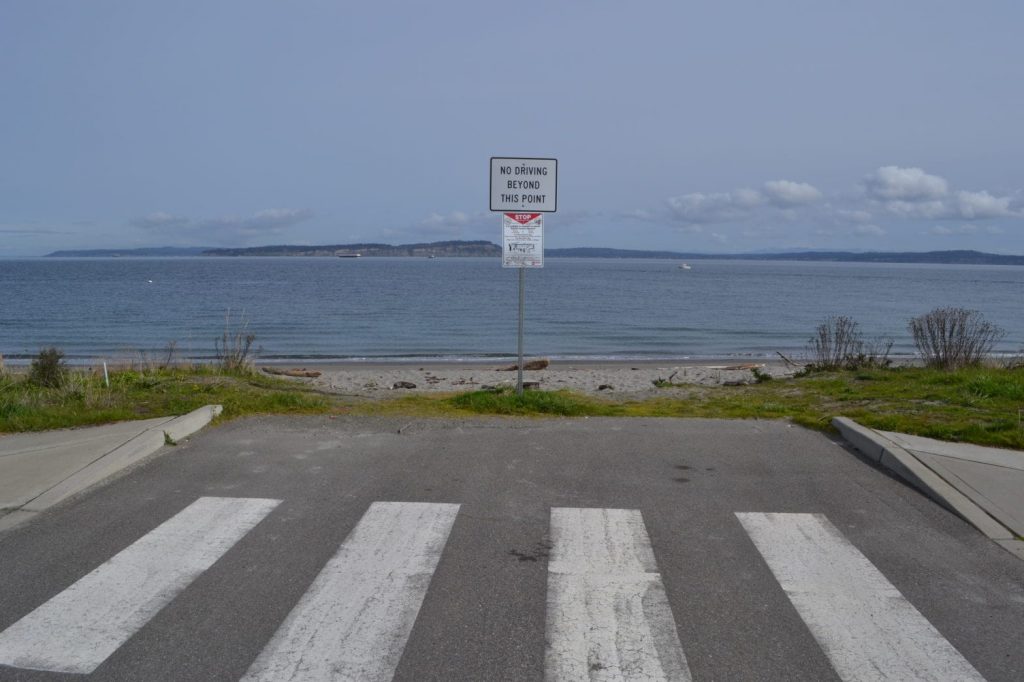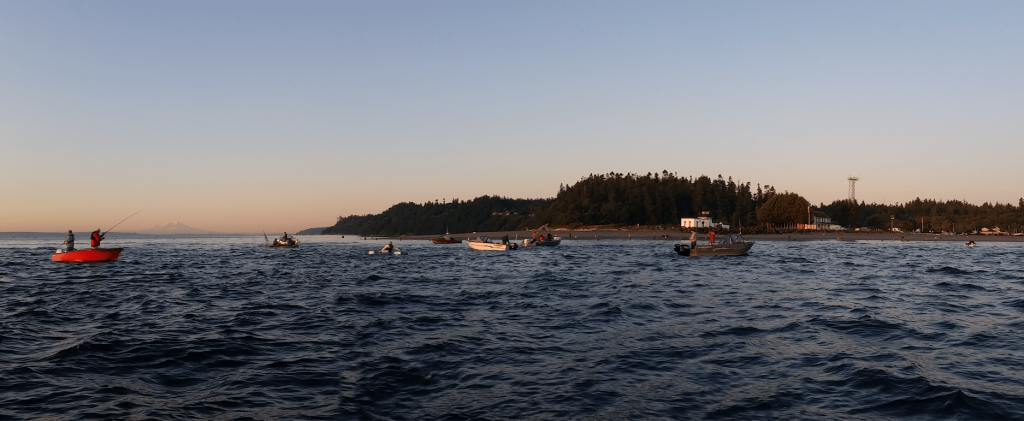
Corps Denies WDFW Permit For New Point No Point Ramp
Editor’s note, 11:30 a.m., July 30, 2021: See our follow-up story WDFW, Angler Advocate, Tribe React To Corps’ PNP Boat Ramp Denial for more reaction.
A federal official has denied WDFW a permit to build a small new boat ramp at the site of an old fishing resort at Puget Sound’s Point No Point, saying it would “result in an impermissible abrogation” of a local tribe’s treaty fishing rights.

Col. Alexander “Xander” Bullock, the district engineer for the Corps of Engineers, advised Director Kelly Susewind of his decision in a brief letter yesterday.
“Your application for a Department of the Army (DA) permit is denied without prejudice,” Bullock wrote. “I reached this decision because the Suquamish Tribe has raised and substantiated an objection to permit issuance on the basis that the Tribe’s access to usual and accustomed fishing places would be impeded in contravention of its reserved rights under the Treaty of Point Elliott, ratified in 1859.”
It’s a bitter development in a seven-year-long wait for WDFW, which has spent at least nearly $3 million on the project and seen another million-plus dollars for construction of a one-lane concrete ramp without docks down to the low tide line slip through its hands due to the “extended delays.” At one point in 2016 the agency thought it was close to reaching a deal with the Suquamish Tribe if it purchased fish food for a tribal salmon hatchery.
“We’re deeply disappointed with the US Army Corps of Engineers decision to deny the permit to construct a small boat launch at Point No Point,” said Susewind in a statement issued to this reporter Friday morning. “Over the years, the Department has conducted extensive outreach with the Corps, the tribes, the county, and the public about this ramp that would have improved boating access for everyone. The proposed public ramp was intended to replace a private fishing resort boat launch structure that was removed by the Department, along with nearly 100 creosoted pilings. We need to assess our options on how best to proceed and we will continue to work with partners to ensure there is sufficient boating access to this area.”
The Suquamish Tribe chair and a tribal attorney did not immediately respond to a request for comment.
According to a website maintained by Point No Point ramp advocates, “This US Army Corps decision may be applied to any saltwater ramp in Washington State,” meaning it might have wider implications than just access for local anglers, crabbers, sailors and other boaters, a possibility WDFW has previously raised.
The effort to put in a new boat ramp at PNP dates back to WDFW’s 1996 purchase of the 3.4-acre site of a former private fishing resort near the northern tip of the Kitsap Peninsula. The agency cleaned it up, removing 90 creosote pilings, a pier and a rail launch system that extended 100 yards into the water.
After submitting an application to the Corps in late 2013 to build in Puget Sound, WDFW then put in new paving, launch lane, parking lot for 20 truck-and-trailer combos, handicap access and restroom on upland portions of the site.
Per a Kitsap Sun article, as of 2019 WDFW had spent $2.9 million on “acquisition, design and permitting, acquisition of two mitigation sites, demolition of pre-existing in-water structures and construction of the parking area.”

Meanwhile, a back-and-forth with the Suquamish Tribe had ensued.
It’s detailed on a timeline put together by ramp supporters, a list that includes the Puget Sound Anglers, Bremerton Sportsmen’s Club, Kitsap Parks Advocates, Coastal Conservation Association, Kitsap Poggie Club and Northwest Marine Trade Association, and it picked up in intensity in 2020 as the presidential election neared.
Last July, the Corps said its goal was to “have a final decision no later than January 2021,” which the fishing and boating organizations heralded as “welcome news.”
But the end of this year’s first month came and went and was followed by further WDFW consultations with other nearby tribes. The Swinomish and Tulalip Tribes also sent the Corps letters of support for the Suquamish Tribe’s objections.
Bullock’s decision apparently can’t be appealed, but his letter states that Susewind can “reinstate processing of the Department of the Army permit application should you conclude an arrangement by which tribal objections are resolved and withdrawn.”
Suquamish worries boiled down to two primary elements. They called the proposed facility “an obstacle that our fishermen will be forced to maneuver around and avoid thus excluding the Tribe from engaging in treaty-reserved fishing and harvesting activities.”
And they said it would concentrate boat traffic in a “treaty reserved fishing ground and station” and interfere with tribal fishermen and damage their gear.
Their main fisheries are Dungeness crab and what are called C&S, or ceremonial and subsistence, seasons for Chinook with hook-and-line gear or purse seines.
“The Tribe should not bear the burden of a flawed WDFW project that fails to address treaty fishing impacts under an application for a federal permit,” Chairman Leonard Forsman stated in a late July 2020 letter to the Corps asking the permit to be denied.
That led to an early September response from Susewind, who said that Suquamish vessel traffic concerns were “hypothetical” and that there was no solid evidence that it would have more than a de minimis, or trivial, impact on treaty harvest rights.
He said the tribe had not explained how boats just a bit bigger than the kayaks launched there now “would transform the activity into one that substantively impairs their treaty rights.”
Anglers would steer around tribal boats and gear rather than needlessly collide with the watercraft or foul their props in ropes or nets and ruin a day on the water.
“In maintaining its objections, the Tribe also fails to reflect on its obligation to share open navigable waters in common with the general public,” Susewind added. “The mere fact that the proposed replacement boat ramp will enable boats to launch into waters designated as treaty fishing grounds and stations does not prove a treaty right violation so as to mandate rejection of the Corps permit. If that was the case, no dock in all of Puget Sound could be permitted.”
Former WDFW Director Jim Unsworth also touched on the wider implications in a 2015 letter to the Corps, stating, “Legally, we dispute the Tribe’s claim about fishing interference because that claim implies that the Tribe has exclusive rights to the surface waters in their (usual and accustomed fishing area). WDFW believes the Tribe’s off-reservation treaty fishing rights must be exercised in common with all other state citizens. The public has the right to recreate and fish over the state’s navigable waters.”
A 46-page “Memorandum For Record” issued by the Corps this April outlines the project’s chronology, tribal objections, WDFW responses, the Corps’ trust responsibility, offers answers to WDFW’s arguments, and details the “three essential questions” Col. Bullock analyzed to determine whether the Suquamish Tribe had proven their claims the ramp would “physically block access” to their U&A.
“First, is the project within the tribe’s usual and accustomed fishing grounds and stations?” the memo asks. “Second, would the proposed project have an effect on the tribe’s access to those fishing places as reflected in documented evidence of past, present, or future fishing activity at that location? Third, based on these particular facts as presented and substantiated to the Corps in regards to this particular DA-regulated activity, and given the existing case-law, would the authorization of this DA-regulated activity result in an impermissible abrogation of the treaty right because of the extent it impairs or obstructs the tribe’s access to U&A places? Each of these issues has been thoroughly evaluated and considered by the Corps based on the particular facts regarding the nature of the effects of this project proposal on tribal activities in the administrative record, as provided by the Tribe and the Applicant.”
The questions presaged Bullock’s eventual decision.
He did acknowledge the work WDFW put into the application and its “patience throughout this process.”
Then Bullock ordered, “Because a DA permit is necessary for this work, do not commence construction before obtaining a valid permit.”
Per Cornell Law School, the term abrogate means “To formally annul or repeal a law through an act of the legislature, constitutional authority, or custom. In contract and insurance law, it is to rescind or terminate a contract; In constitutional law, the abrogation doctrine refers to the power of Congress to revoke a state’s sovereign immunity and authorize suits against that state.”
While anglers and others will still be able to carry kayaks and other small craft down to the beach to mooch and troll fishy Point No Point, the new ramp would have serviced Kitsap Peninsula anglers with larger craft who otherwise must run the 7 to 10 miles up from Kingston or around Foulweather Bluff from Salsbury Point County Park on upper Hood Canal.
The Suquamish have said that WDFW should instead upgrade the Salsbury ramp and keep PNP as a hand-launch-only site, with a sunset clause to review its usage and purpose after 40 years.
But the recent near-drowning of two Point No Point beachgoers, including a 10-year-old boy, who had to be rescued with a 12-foot log from rip currents points to public safety needs here that will go unmet without better boating facilities for first responders.
The news the permit denial follows last week’s filing of a motion for a preliminary injunction on fishing for Puget Sound Chinook and other salmon species by an Anacortes-based fishing group, which if granted by a federal judge would impact fisheries later this summer.
And it comes as WDFW has irons in the fire with the feds over access to the lower Skokomish River, part of an unresolved Skokomish Reservation boundary dispute.


